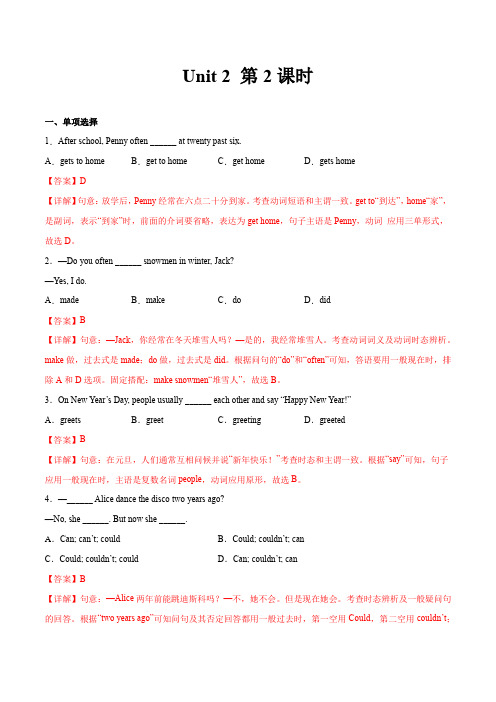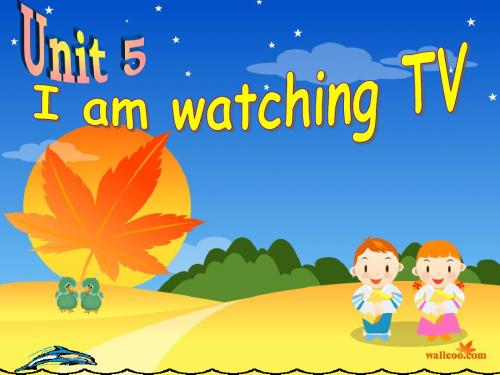初一同步辅导英语Unit2-2
人教新目标七年级英语上册UNIT2同步辅导

人教新目标七年级英语上册UNIT2同步辅导【同步教育信息】一. 本周教学内容:Unit 2 What’s this in EnglishHello, everyone! Nice to meet you.通过第一单元的学习,相信同学们已经有了一个好的开端,而且会对以后的学习更增添了一份信心。
同学们,加油吧!好的!下面我们先来继续上一讲有关元音音标知识的讲解。
(一)1. 元音字母i或i+其它字母字母或字母组合音节类型或在词中的地位读音例词i 重读开音节[ai] t i me, l i ke, n i ce, wr i te, r i ceb y, sk y, m y, wh y(y) 重读闭音节[i] i t, h i s, b i g, sh i p, s i t, w i n-dow,be-g i n, m y thie 在重读音节中辅音字母前[i:] f ie ld, a-ch ie ve, be -l ie ve 在重读单音节词的词尾[ai] d ie, l ie, t ieigh 在重读音节中[ai] h igh, s igh, n igh t, r igh tir 在重读音节中[:] f ir st, sh ir t, g ir l, th ir-ty字母或字母组合音节类型或在词中的地位读音例词重读开音节[u]s o, n o, g o, h o me, th o seo重读闭音节[]n o t, dr o p, b o x, m o d-el在m, n, v或th前[]c o me, m o nth, fr o nt, l o ve,m o ther,br o theroa在重读音节中[u]b oa t, r oa d, c oa t, s oa poi oy 在重读音节中[i]j oi n, oi l, sp oi l, n oi seb oy, t oy, em-pl oyoo在多数情况下[u:]t oo, p oo l, sch oo l, s oo n, after-n oo n 在k前[u]b oo k, l oo k, c oo kor在重读音节中[:]or, f or, sp or ts, h or se在[w]后面[:]w or k, w or ker, w or ld, w or seou在多数情况下[au]ou t, h ou se, ab ou t, r ou nd在“ght”前[:]ou ght, f ou ght, b ou ght, th ou ghtow在重读音节中[au]h ow, n ow, d ow n, t ow n在重读或非重读音节中[u]kn ow, gr ow, l ow, fl ow, win-d ow,yel-l ow3. 元音字母u或u+其它字母字母音节类型或在词中的地位读音例词u重读开音节[(j)u:]u se, bl u e, J u ne, d u-ty, r u-ler 重读闭音节[]u s, b u t, d u ck, m u g, pl u s, c u p, r u b-ber ur在重读音节中[:]n ur se, t ur n, Th ur s-day4. 元音字母在非重读音节中大多数读[]或[i]字母或字母组合读音例词a[]Chin a, a bout, a bove, A merica[i]vill a ge, comr a dee[]stud e nt, op e n, hundr e d, spok e n,qui e t[i]b e side, jack e t, b e long, darkn e ssi(y)[i]off i ce, man y, stud y, cit y, fift yo[]pr o test, pr o ductionu[]diffic u lty, rostr u m下面请同学们跟读以下字母或单词,掌握元音字母i,o,u在单词中的正确发音。
初中英语新人教版七年级上册Unit 2 (第2课时) 教学课件(2024秋)

Listening & Reading
2a Listen to the conversation and circle the coloured
words you hear.
Teng Fei: Hi, Peter! Come in./Welcome.
Peter: Thanks. Oh, these ping-pong bats are nice. Whose
of time fishing.
弹钢琴
Peter: Hey, do you play the piano?
Teng Fei: No, it’s my mother’s piano. She can play it
really/very well!
Language point
He spends a lot of/lots of time fishing.(教材P29 2a) spend/spend/ v.花费 spend的 sb. spends time/money doing sth.某人花费时间/金钱做某事 sb. spends time/money on sth.某人在某事/物上花费时间/ 金钱
A: Whose erhu is this? B: It’s Xinyu’s erhu. 拉二胡
A: Does she play the erhu well?
B: Yes, she does. A: …
n.园艺
often play basketball;read a lot ;like Chinese chess ; play the erhu well;like gardening ;love animals
Post-listening
七年级英语上册Unit 2 Let's play sports 第2课时 reading同步练习题

Unit 2 第2课时一、单项选择1.After school, Penny often ______ at twenty past six.A.gets to home B.get to home C.get home D.gets home【答案】D【详解】句意:放学后,Penny经常在六点二十分到家。
考查动词短语和主谓一致。
get to“到达”,home“家”,是副词,表示“到家”时,前面的介词要省略,表达为get home,句子主语是Penny,动词应用三单形式,故选D。
2.—Do you often ______ snowmen in winter, Jack?—Yes, I do.A.made B.make C.do D.did【答案】B【详解】句意:—Jack,你经常在冬天堆雪人吗?—是的,我经常堆雪人。
考查动词词义及动词时态辨析。
make做,过去式是made;do做,过去式是did。
根据问句的“do”和“often”可知,答语要用一般现在时,排除A和D选项。
固定搭配:make snowmen“堆雪人”,故选B。
3.On New Year’s Day, people usually ______ each other and say “Happy New Year!”A.greets B.greet C.greeting D.greeted【答案】B【详解】句意:在元旦,人们通常互相问候并说“新年快乐!”考查时态和主谓一致。
根据“say”可知,句子应用一般现在时,主语是复数名词people,动词应用原形,故选B。
4.—______ Alice dance the disco two years ago?—No, she ______. But now she ______.A.Can; can’t; could B.Could; couldn’t; canC.Could; couldn’t; could D.Can; couldn’t; can【答案】B【详解】句意:—Alice两年前能跳迪斯科吗?—不,她不会。
七年级上册英语Unit2同步练习

七年级上册英语Unit2同步练习七年级上册英语Unit2同步练习初一往往起到一个打基础的阶段!那么,对于初一英语,往往要怎样复习呢?别着急,接下来不妨和店铺一起来做份七年级上册英语Unit2同步练习,希望对各位有帮助!Ⅰ.按要求完成下列句子。
1.It's her family photo.(改为同义句)It's a ________ ________ her family.2.this,a,photo,his,school,is,of (连词成句)___________________________________________Ⅱ.根据汉语意思完成句子,每空一词。
3.那是一张中国地图。
That is ________ ________ ________ ________.4.这条狗的'名字是Coco。
The ________ ________ ________ ________ is Coco.题组训练二 here的用法Ⅰ.单项选择。
( )1.—________your pictures. They're very nice.—Thanks.A.Here isB.Here areC.He isD.She is( )2.—Here________two books for you.—Thank you.A.beB.amC.isD.are( )3. Here ________ a pen for your sister.A.amB.isC.areD.aren'tⅡ.根据汉语意思完成句子,每空一词。
4.这里有四幅图画。
________ ________ four ________.5.这里有一件紫色的夹克衫。
________ ________ a purple jacket.6.这里有三个橙子。
________ ________ three ________.题组训练三 it、he、she、they的用法单项选择。
7AUnit2同步讲义

学员编号:年级:初一课时数:3 学员姓名:辅导科目:英语学科教师:课程主题:7AU2 授课时间:学习目标教学内容内容1.课后作业讲解一、同步知识梳理Unit 2 Our animal friends1。
officer ['ɔfisə] n. 官员;高级职员【词性转换】office ['ɔfis] n. 办公室A police officer came to help when our car broke down on the way.我们的汽车在路上出了魔兵,一位警官帮了我们的忙2。
society [sə'saiəti] n. 社团;协会【词性转换】 social [’səuʃəl] adj. 协会的;社会的The Chemical Society of China 中国化学学会3. prevention [pri’venʃən] n. 预防;防止;防范【词性转换】 prevent [pri’vent] v。
预防,防止Prevention is better than cure。
预防胜于治疗.4. cruelty [’kru:əlti] n。
残酷【词性转换】 cruel [’kruəl] adj. 残酷的,悲惨的cruelty to children 虐待儿童5。
someone ['sʌmwʌn] pron。
某人【近义词】somebody [’sʌmbədi] pron. 某人,有人Someone wants to talk with you. 有人想和你谈话。
6. puppy ['pʌpi] n。
小狗;幼犬【提示】 dog一般用来指“成年狗"或表示狗的总称;puppy特指小狗,复数形式为puppies,类似地,cat表示“成年猫”或猫的总称,kitten表示小猫7。
thirsty [’θə:sti] adj. 口渴的【词性转换】 thirst [θə:st] n. 口渴2. prefer意为“更喜欢”,当用的形式有:① prefer to do sth。
(北师大版)初一英语同步辅导(含同步练习)Unit2Families(2)

(北师大版)初一英语同步辅导(含同步练习)Unit2Families(2)Unit2 Families(2)一.教学内容:Lesson 7 My mom likes comedies.Lesson 8 I prefer watching action movies.二. 重点、难点:学会表达喜欢,不喜欢学会连词and, but, or的用法Lesson 7 My mom likes comedies.I. Words Study单词学习:action movie documentary sports program comedy romantic horror just always fight agree love different thing hate either favorite actress personII. Expression Patterns常用的表达方式:1. 各类电影的表达方式drama 剧情片romantic comedy 浪漫喜剧片comedy 喜剧片romance 浪漫片artsy movie 艺术片alternative movie 另类片foreign movie 国外片documentary 记录片action movie 动作片horror movie 恐怖片thriller惊悚片animation 动画片sci-fi movie (science fiction)科幻片2. 喜欢的表达方式1)A: Do you like … ? / Do you love …?B: Yes, I do. I like … / Yes, I love …No, I don’t. I don’t like… / No, I don’t. I don’t love…如果说喜欢做某件事,like或love后面应该接动名词like v-ing / love v-ing-Does your dad like horror movies?-Yes, he loves horror movies.-Does he like comedies?-No, he doesn’t.2) A: What is your favorite?B: My favorite is …(1)favorite a. 喜爱的,中意的Her favorite writer is Hens Anderson.(2)favorite n. 特别喜欢的人(或物)The Livepool Metropole is my favorite.在英语中,表达喜欢或不喜欢有很多方法,不同的方法反映了不同的程度。
人教版七年级下英语同步辅导unit2

It’s a fine Sunday morning.Many children _____ _______ are (be) in the park. They are playing (play) happily(高兴地). Some are playing under the tree. Some girls are singing and dancing _______ (dance). Some boys are _______ sitting (sit 坐)on the hill(小山). Jim is near the lake.He’s reading _______ (read) a story.Where are They’re (他们) standing Sam and Dale? ________ over there.What are they ________(do)? doing don’t (do not) know. Sorry, I _______
watching TV
talking on the phone
cleaning
reading
a b c f
e
V-ing 变化规则:
1) 一般加 ing . 如: play----playing watch----watching 2) 以不发音的e 结尾,去e 加ing. 如: take----taking come---coming 3) 元+辅结尾,且是重读闭音节的单词,双写辅音字母+ing. 如:run----running swim----swimming
He is playing the guitar.
T: What is she doing?
初一英语自学辅导大全 unit 2

6. excuse vt. 原谅
例:Excuse me, can I ask you a question? 打扰一下,我能问一个问题吗?excuse作动词时是“打扰,原谅”的意思, 在这里是一种习惯用语,用作打扰别人,表示不赞成,不同意或失礼时的道歉用语,如:Excuse me, is anybody sitting here?请问,这儿有人坐吗?excuse还可作名词,意思是“理由,借口”,如:There is no excuse for this.对于这件事是没有理由的。
初一英语自学辅导大全 unit 2
Unit 2 Can you spell it? 在与别人打招呼的时候,会涉及到很多礼节方面,那么如何表达呢?下面我们就来看看。
本单元热点归纳与拓展
例: 1. —____, are you Jim Green?
—________. I don’t know him.A. Sorry B. Excuse me
3.辨析 “Can you spell it?”与 “How do you spell it?”:
这两句话在意义上是有区别的。Can you spell it?是一个一般疑问句,它强调的是能力,意思是“你能拼写它吗?”回答时必须要用“Yes”或“No”。而How do you spell it?是一个特殊疑问句,它的意思是“这个单词应如何拼写?”回答时不需用“Yes/No”回答,直接把所问的单词拼写出来即可,如果不会拼写,要说“Sorry, I don't know.”。
【记忆技巧】 词性转换比较记忆:teach(v. 教)+后缀“-er”→teacher (n. 教师),类似的还有:work(v. 工作)+er→worker(n. 工人),drive(v. 驾驶)+(e)r→driver (n. 司机)
- 1、下载文档前请自行甄别文档内容的完整性,平台不提供额外的编辑、内容补充、找答案等附加服务。
- 2、"仅部分预览"的文档,不可在线预览部分如存在完整性等问题,可反馈申请退款(可完整预览的文档不适用该条件!)。
- 3、如文档侵犯您的权益,请联系客服反馈,我们会尽快为您处理(人工客服工作时间:9:00-18:30)。
本周学习重点七年级上册Unit 2 Daily Life重点语法:1.一般现在时态2.频度副词(短语)重点及难点解析一般现在时态〖教材典句〗1.My school is close to my home, so I always go to school on foot. 我学校与我家很近,因此我总是步行去上学。
2.Classes start at 8 a.m, and I am seldom late. 早上8点开始上课,我很少迟到。
3.We have our morning break at 9:50 a.m.. 我们在上午9:50休息。
4.Break ends at 10:10 a.m. 在上午10:10休息结束。
5.When the bell rings, I run to the playground with my best friends Tom and Jack.当铃声响起的时候,我和我最好的朋友汤姆和克杰跑到操场上。
以上5个句子的时态都是用一般现在时,也是我们本单元的语法知识点。
〖语法全解〗1.基本概念表示包括现在在内的经常性、习惯性发生的动作或存在的状态。
2 一般现在时态用法1)一般现在时表示经常的、习惯性的动作或目前存在的状态。
e.g. I often go to school by bike.My father is a doctor.2)表示普遍真理和客观事实。
The earth moves around the sun.The sun is bigger than the moon.3)有时这个时态表示按计划、规定要发生的动作(句中都带有时间状语),但限于少数动词,如:begin, come, leave, go ,arrive, start , stop, return, open, close等。
例如:a. The meeting begins at seven.b. The rain starts at nine in the morning.4)表示状态和感觉的动词(be, like, hate, think, remember, find, sound 等)常用一般现在时。
a. I like English very much.b. The story sounds very interesting.3. 一般现在时态构成1)be动词型:句子的谓语动词只有be(am,is或are):a.肯定句中,只出现be,如:e.g I am a student.我是一名学生。
b.否定句中,要在be后面加not,如:e.g I am not a student. 我不是一名学生。
c.一般疑问句,要将be放在句子开头(注意句首字母大写),句尾用问号,答语用Yes,主语+be.或No,主语+be+not.如:e.g. —Are you a student? 你是一名学生吗?—Yes,I am 是的,我是。
—No,I'm not.不,我不是。
转换句型:The dog is three years old.(改为一般疑问句)(改为否定句)2)实义动词型:句中的谓语动词为实义动词(也叫行为动词):1. 主语为第一,二人称及第三人称复数及复数主语( I ,we, you ,they,复数主语)肯定句:主语+动词原形+其它。
否定句:主语+don’t + 动词原形+其它。
一般疑问句: Do+ 主语+动词原形+其它?特殊疑问句:特殊疑问词+do+主语+动词原形+其它?e.g 肯定句:I go to school every day.否定句:I don't go to school every day.一般疑问句:Do you go to school every day?肯定回答:------Yes, I do,否定回答:-------No, I don't.特殊疑问句:How often do you go to school?句型转换I do my homework every day .(改为一般疑问句并作否定回答)——you homework every day?——No, I .2 主语为第三人称单数(she, he, it ,单数主语)肯定句:主语+动词”三单“+其它。
否定句:主语+doesn’t + 动词原形其它。
一般疑问句: Does+ 主语+动词原形+其它?特殊疑问句:特殊疑问词+does+主语+动词原形+其它?e.g 肯定句:He usually gets up at six否定句:He doesn't usually get up at six .一般疑问句:Does he usually get up at six?肯定回答:Yes, he does.否定回答:No, he doesn’t.特殊疑问句:When does he usually get up?句型转换She likes milk.(改为一般疑问句并作肯定回答)_____she milk?Yes., she ..3 动词第三人称单数变化规则1一般情况+S,work---works run---runs like---likes2 以辅音字母+y结尾的词,去y加ies e.g. study----studies try--tries3 以ch,sh,s,x,o,结尾的动词在后加es, e.g. watch--watches teach---teaches go--goes, do--does4 have-----has4 一般现在时常与频度副词(短语)连用。
1)频度副词有:频度由高至低:always,usually, often , sometimes,seldom(很少),hardly(几乎不),never ( 从不)放在be动词,情态动词及第一个助动词后,实义动词前面。
这几个都是频率副词,表示事情发生的频度。
其中,seldom与hardly表示否定概念,经常与一般现在时连用。
频率副词主要放在实义动词之前,be动词或情态动词或助动词之后。
提问频率时,用how often。
2)频率短语;every week, every year, twice a week on Mondays, three times a day , on Sundays 通常放在句末。
汉译英1他总是很晚睡觉。
__________________________________________________________________________________________2他几乎走不动了。
__________________________________________________________________________________________3他从不会晚起床。
__________________________________________________________________________________________Keys:1)He always goes to bed late.2)He can hardly walk.3)He never gets up late.自我检测—做一做一.选择题()1 --Where ____you ______? (2012学年七年级第一学期广州市第四十七中学期中考试)--Beijing.A. are, come fromB. do, fromC. /, come fromD. are, from( )2 I always get up at six o'clock. My mother__23__ up at six o'clock.. A. get B. getting C. gets D. got(2012学年七年级第一学期广州市第四十七中学期中考试)( )3 After school, I usually____ at half past four. (2012学年七年级第一学期广州市第四十七中学期中考试). A. walk home B. walks home C. walk to home D. walks to home( ) 4. In his free time, he usually _____ together with Tom. (十六中2012年七年级第一学期期中测试英语)A. play guitarB. play the guitarC. plays guitarD. plays the guitar( ) 5. David usually _____ Sunday afternoons _____ computer games with his brother.A. takes; playingB. spends; playingC. spends; to playD. takes; to play(十六中2012年七年级第一学期期中测试英语)( ) 6. You must stop _____. It’s bad for your health. (十六中2012年七年级第一学期期中测试英语)A. smokeB. to smokeC. smokingD. to smoking( ) 7. -- Do you often go home late? (十六中2012年七年级第一学期期中测试英语)-- No. I _____ go home after six o’clock in the afternoon.A. sometimesB. usuallyC. alwaysD. seldom()8 My brother often ________ his teeth first while his brother usually ________ his face first every morning.A. brush, washB. brushes, washC. brush, washesD. brushes, washes()9 Would you like ________ dinner with us?(2012学年第一学期广州二中初一年级应元、苏元期中考联考A. haveB. havingC. to haveD. to having()10 --Do you often go to the gym? (2012学年第一学期广州二中初一年级应元、苏元期中考联考--No, ________. I do not like sports at all.A. alwaysB. neverC. sometimesD. usually()11 ________ you good at ________? (2012学年第一学期广州二中初一年级应元、苏元期中考联考A. Do, swimB. Do, swimmingC. Are, swimmingD. Are, swim()12 We must ________ the restaurant before 8:00. (2012学年第一学期广州二中初一年级应元、苏元期中考联考A. reach toB. getC. arrive inD. arrive at()13 Jack was so clever that he could find out the answer ________ this question in one minute.A. ofB. withC. aboutD. to()14 My mom enjoys ________. (2012学年第一学期广州二中初一年级应元、苏元期中考联考A. walking homeB. to walk homeC. walking to homeD. to walk to home()15 Debbie got up early last Saturday morning .She wanted __31___ skatingA . goes B. go C. going to D. to go( ) 16 It ______ rains at this time of year so the weather is very dry. (广州市第二中学2012学年第一学期英语期中考试)A. oftenB. usuallyC. sometimesD. seldom( ) 17 In winter, it often ________ so the weather is ________ here.A. rain, rainingB. rains, rainyC. raining, rainyD. rainy, rain( )18 In summer, a lot of people enjoy _________ to the beach.A. goingB. to goC. goD. goes( ) 19. I _________ my e-friend Jason yesterday.. (广州市第二中学2012学年第一学期英语期中考试)A.hear ofB. hear aboutC. heard toD. heard from( ) 20. I want to make _________ with all the _________ people in the world.A. friend, friendB. friends, friendlyC. friendly, friendD. friends, friend(广州市第二中学2012学年第一学期英语期中考试)二、用所给动词的正确形式填空。
